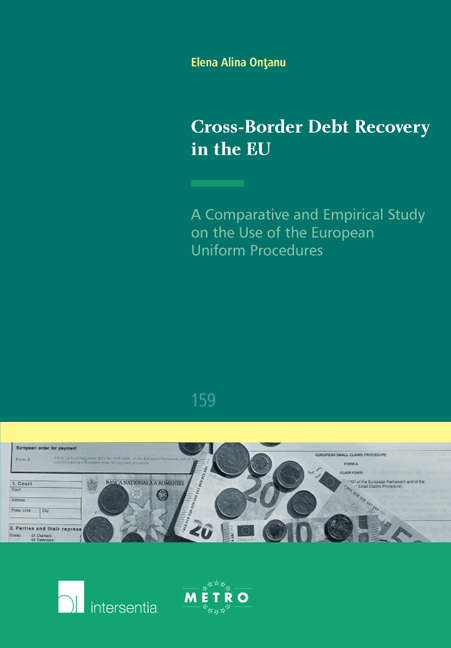 Cross-Border Debt Recovery in the EU
Cross-Border Debt Recovery in the EU Book contents
- Frontmatter
- Acknowledgements
- Contents
- Abbreviations
- Chapter 1 Introduction
- Chapter 2 A European Perspective on the EOP and the ESCP
- Chapter 3 England and Wales
- Chapter 4 France
- Chapter 5 Italy
- Chapter 6 Romania
- Chapter 7 Comparative Perspectives on the Functioning of the EOP and ESCP
- Chapter 8 Conclusions
- Samenvatting
- Annex
- Bibliography
- Table of Cases
- Curriculum Vitae
- Ius Commune Europaeum
Chapter 1 - Introduction
Published online by Cambridge University Press: 11 October 2018
- Frontmatter
- Acknowledgements
- Contents
- Abbreviations
- Chapter 1 Introduction
- Chapter 2 A European Perspective on the EOP and the ESCP
- Chapter 3 England and Wales
- Chapter 4 France
- Chapter 5 Italy
- Chapter 6 Romania
- Chapter 7 Comparative Perspectives on the Functioning of the EOP and ESCP
- Chapter 8 Conclusions
- Samenvatting
- Annex
- Bibliography
- Table of Cases
- Curriculum Vitae
- Ius Commune Europaeum
Summary
‘La libre circulation des jugements est illusoire si le titre ne se concrétise pas avec la meme efficacité dans les États membres.’
‘Basically, the main problem associated with execution is that of making it effective.’
A Union of Law and Uniform European Procedures
Access to justice and effective enforcement mechanisms are crucial for a European Union built on the rule of law, aimed at protecting citizens’ rights, and supporting economic activities undertaken on the basis of the four fundamental freedoms. The free circulation of judgment, which can be ‘held to be a fifth freedom’ can enhance the outcomes of these freedoms for citizens and businesses within the EU. Well-developed legal mechanisms are necessary to increase enforcement efficiency and to discourage bad faith debtors from channeling their activities and funds into Member States where they can escape enforcement. Cross-border litigation can be particularly cumbersome for parties due to the diversity of applicable rules, lengthy proceedings, and significant costs that can easily reach disproportionate levels. The complexity of a national procedural system, the lack of transparency of applicable national procedural rules, the limited familiarity with other justice systems, and slow and ineffective enforcement mechanisms can be a serious disincentive for creditors to take action and defend their rights. The diversity of procedural rules in cross-border litigation places litigants in an unequal position, having to accept diverse handling and varying costs for the same type of claim in different Member States.
The purpose of procedural law is to insure the effectiveness of law (substantive norms) and to provide judges with appropriate instruments to interpret and apply the law. It determines how substantive legal rights and duties ‘must be established, effected or shaped in legal proceedings’. Civil procedure rules ‘are the expression of fundamental rights’, as recognised by national constitutions, the Charter of Fundamental Rights of the European Union (Charter), and international treaties. They ‘maximize efficiency of justice systems while at the same time not limiting fundamental rights of litigants’. Securing access to justice and, in particular, to ‘equally efficient justice throughout the European Union’ is crucial for safeguarding the right to a fair trial, as laid down by Article 6 European Convention for the Protection of Human Rights and Fundamental Freedoms (ECHR) and Article 47 Charter.
- Type
- Chapter
- Information
- Cross-Border Debt Recovery in the EUA Comparative and Empirical Study on the Use of the European Uniform Procedures, pp. 1 - 20Publisher: IntersentiaPrint publication year: 2017


